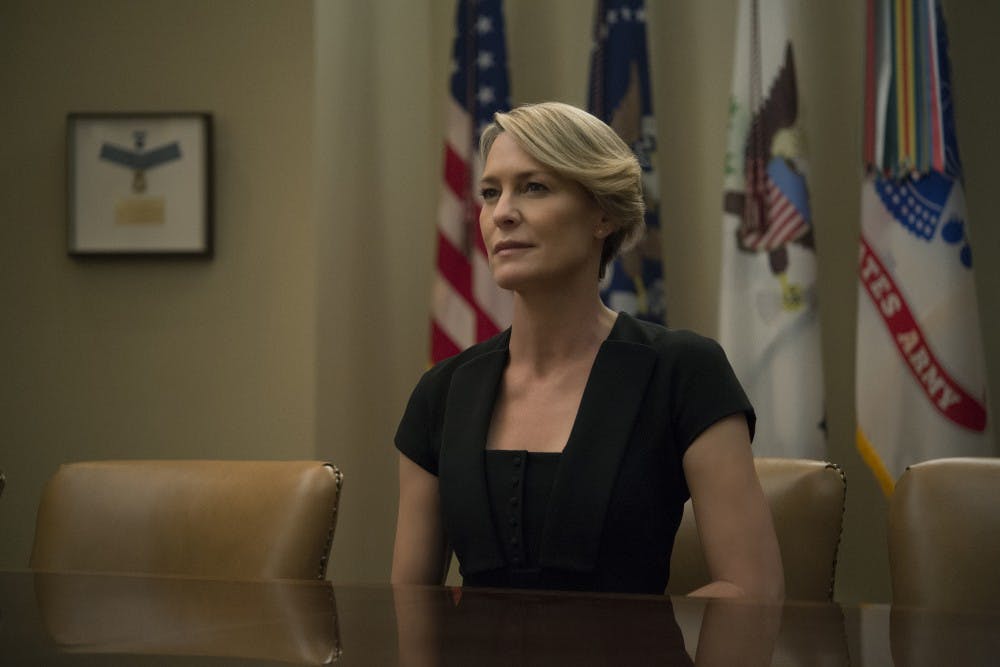If all the world’s a stage, then Washington, D.C. is the mighty Globe Theatre itself.
Need proof? Just turn on the TV and flip to any news broadcast. Reality stars, family disappointments and absurd Zodiac killer connections are just a few headlines that stem from what Rolling Stone affectionately calls the “GOP clown car.”
Not to romanticize the left either. The reincarnation of Eugene V. Debs and a representative of Wall Street are certainly shocking choices for candidates, as well.
None of this is new, either. Washington, D.C. has had a devilishly affectionate history with melodrama. Don’t forget fiends like Richard Nixon, Andrew Jackson and Harry S. Truman have served time in office.
This sort of political lunacy has been best represented in the popular Netflix original series “House of Cards,” which has recently released its fourth season for streaming.
Though based in fiction, the plotlines of “House of Cards” don’t deviate too far from the events occurring every day in the American Rome.
In fact, like the United States capital, the TV show has roots dating all the way back to the works of William Shakespeare. “Richard III,” “Julius Caesar,” “Othello” and “Macbeth” make up the primary influences of the show.
We also cannot deny their distinct parallels with political figures of past and present.
Let’s look at Frank Underwood, played by Kevin Spacey. This bloodthirsty, power-hungry tyrant no doubt takes his influence from likable Shakespeare villains like Richard III, Macbeth and Iago.
All three of these characters, like Frank, consistently break the fourth wall by talking to the audience in soliloquies. Just like the villains’, his are also cryptic, nihilistic and threatening to characters surround him.
Much like Macbeth and Richard III, Frank only desires one thing: power. He mentions this often throughout the show, as well as how he loathes and distrusts those who do not share the same passion.
Most of all, Frank is a cinematic embodiment of former president and fellow majority whip Lyndon B. Johnson.
I would call Frank a caricature of Johnson, but if even half the rumors surrounding Johnson are true, then Frank is the PG version.
Last month, a series of tapes released revealed former first lady Jackie Kennedy believed the assassination of John F. Kennedy was orchestrated by Johnson.
He is also possibly connected with at least 17 murders committed to cover up corruption, bribery and voter fraud.
This allegedly violent connection with Kennedy only makes the comparison between the assassinated president and Garrett Walker, played by Michel Gill, who served as president for the first two seasons.
Garrett is the type of Boy Scout president who you expect only wants to do what is best for his country and will take the flak whenever something goes wrong.
His naivety, like Kennedy’s, ultimately leads to his downfall. While Garrett isn’t killed, his career is tarnished when he’s framed and impeached.
Such boyish ignorance could compare him to similar sympathetic fools, like King Duncan in “Macbeth” and the titular character in “Othello.”
Claire Underwood, played by Robin Wright, as first lady and wife to Frank, is truly one of the most complex and impressive female TV characters in the past decade. Her only real competition is Skyler White in “Breaking Bad” and Daenerys Targayen in “Game of Thrones.”
Comparing her to anyone grounded in reality is no easy gig. The most reasonable analogy would be to current Democratic candidate Hillary Clinton. Both share great political secrets as well as a domineering presence over their husbands.
This is a loose comparison, however. If you want the best, and perhaps most intended, allusion of Claire, look no further than in the character of Lady Macbeth.
Like Lady Macbeth, Claire is just as, if not more so, power-hungry as her husband throughout the first two seasons. However, also like the Shakespearean character, Claire begins to experience a dramatic guilt trip that eats away at her happiness.
Frank’s political opponent for the past two seasons, Heather Dunbar, played by Elizabeth Marvel, is without a doubt the Brutus of “Julius Caesar” to this story.
Originally working for Frank as Solicitor General, Heather announced her candidacy against Frank once she became aware of his corruptness. She is viewed through the lens of the show as a traitor, just like Brutus.
Et tu Dunbar?
From a political standpoint, however, she is perhaps modeled after one of the most celebrated left wing politicians of this generation: Elizabeth Warren.
Both politicians endorse highly liberal political stances, especially in regards to women’s rights. Just like Warren, Heather is often seen advocating for gender-equal pay in the workforce.
Regardless of their crooked connections, the characters of “House of Cards” are some of the best TV has seen in years.
If perhaps you think it is wrong to hold such villains in high regards, remember what Frank said: “Of all the things I place in high regard, rules are not one of them.”




